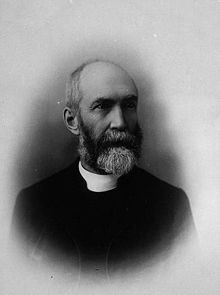George Monro Grant
| George Monro Grant | |
|---|---|

The Very Reverend George M. Grant
|
|
| Principal of Queen's College at Kingston | |
|
In office 1877–1902 |
|
| Preceded by | William Snodgrass |
| Succeeded by | Daniel Miner Gordon |
| Personal details | |
| Born |
December 22, 1835 Stellarton, Nova Scotia |
| Died | May 10, 1902 (aged 66) Kingston, Ontario |
| Spouse(s) | Jessie Lawson |
| Alma mater | University of Glasgow |
George Monro Grant, CMG (December 22, 1835 – May 10, 1902) was a Canadian church minister, writer, and political activist. He served as principal of Queen's College, Kingston, Ontario for 25 years, from 1877 until 1902.
Grant was born in Stellarton, Pictou County, Nova Scotia. He was educated at the Pictou Academy and the anti-burgher seminary in West River in Nova Scotia, and, from 1853 to 1860, in Scotland at the University of Glasgow, where he had a brilliant academic career. Having entered the ministry of the Church of Scotland in 1861, he returned to serve in Nova Scotia and Prince Edward Island, before being called to the St Matthew's congregation in Halifax, Nova Scotia, where he was minister from 1863 to 1877.
He quickly gained a high reputation as a preacher and as an eloquent speaker on political subjects. In 1867, Nova Scotia was the province most strongly opposed to federal union. Grant threw the whole weight of his great influence in favour of Canadian confederation, and his oratory played an important part in securing the success of the movement. When the consolidation of the Dominion by means of railway construction was under discussion in 1872, Grant traveled across Canada, from the Atlantic Ocean to the Pacific Ocean, with the engineers, including lifelong friend, Sir Sandford Fleming, who surveyed the route of the Canadian Pacific Railway. Grant's book Ocean to Ocean (1873) was one of the first things that opened the eyes of Canadians to the value of the immense heritage they enjoyed. He never lost an opportunity, whether in the pulpit or on the platform, of pressing on his listeners that the greatest future for Canada lay in unity with the rest of the British Empire; and his broad statesmanlike judgment made him an authority which politicians of all parties were glad to consult.
...
Wikipedia
